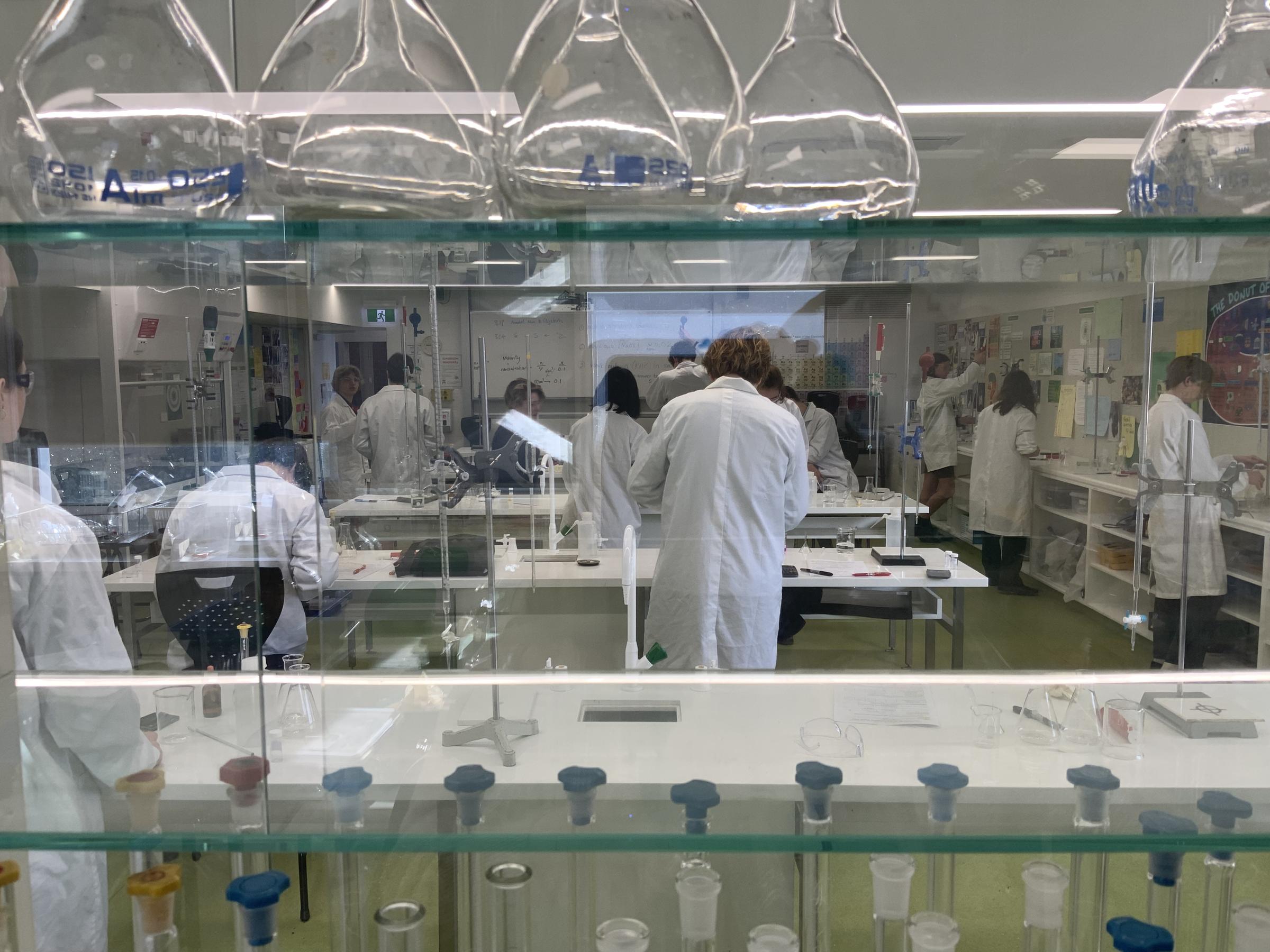IBDP Chemistry

Group 4 | Chemistry
| 🎓 Level | HL & SL |
|---|---|
| ⏱ Hours | 150 (SL) or 240 (HL) |
| 📚 Prerequisite | None |
| ℹ️ IB Course Information | Link (HL) Link (SL) |
Each of the Experimental Sciences has the same course structure:
The Standard Level course involves 150 indicative teaching hours over two years. It consists of core material (95 hours), one option (15 hours), practical investigations (20 hours), an individual project (10 hours) and a Group 4 Project (10 hours), in which students from all Science subjects cooperate on an investigation.
The Higher Level course involves 240 indicative teaching hours over two years. It consists of the SL core material (95 hours), additional HL material (60 hours), one option (25 hours), practical investigations (40 hours), an individual investigation (10 hours) and the Group 4 Project (10 hours). For each course, the options offered are the same but Standard Level students are allocated 15 hours of teaching time for the option, Higher Level students are allocated 25 hours teaching time for the option.
What will I learn?
Chemistry is concerned with the study of the materials in our environment, their properties and the ways in which they react with each other. Laboratory work is an integral part of the course and has a direct bearing on the student’s growing body of descriptive and theoretical chemistry
Topics covered in the Core are:
- measurement and data processing;
- atomic structure;
- stoichiometry;
- periodicity;
- bonding and structure;
- energetics and thermochemistry;
- kinetics;
- equilibrium;
- acids and bases; and
- oxidation and reduction and organic chemistry.
Standard and Higher Level students are required to study an option chosen from Materials, Biochemistry, Energy or Medicinal Chemistry.
Higher level core and option material includes the same topics as the Standard Level but in more detail (Additional Higher Level).
Why should I consider this course?
Chemistry is an experimental science that combines academic study with the acquisition of practical and investigational skills. It is often called the central science, as chemical principles underpin both the physical environment in which we live and all biological systems. Apart from being a subject worthy of study in its own right, chemistry is a prerequisite for many other courses in higher education, such as medicine, biological science and environmental science, and serves as useful preparation for employment in many fields.
Assessment
| Component | Requirement | %HL | %SL |
|---|---|---|---|
| Individual Investigation | 12 pages (10 hours) | 20 | 20 |
| Paper 1: Multiple choice | 45 min / 1 hr | 20 | 20 |
| Paper 2: Short Answer & Extended Response | 1.25 hr / 2.25 hrs | 36 | 40 |
| Paper 3: Experimental Work | 1 hr / 1.25 hrs | 24 | 20 |
What Skills does this course provide?
The Diploma Programme chemistry course allows students to develop traditional practical skills and techniques and to increase facility in the use of mathematics, which is the language of science. It also allows students to develop interpersonal skills, and digital technology skills, which are essential in 21st century scientific endeavour and are important life-enhancing, transferable skills in their own right
Through studying chemistry, students should become aware of how scientists work and communicate with each other. While the scientific method may take on a wide variety of forms, it is the emphasis on a practical approach through experimental work that characterizes the science subjects.
The aims enable students, through the overarching theme of the Nature of science, to:
- appreciate scientific study and creativity within a global context through stimulating and challenging opportunities;
- acquire a body of knowledge, methods and techniques that characterize science and technology;
- apply and use a body of knowledge, methods and techniques that characterize science and technology;
- develop an ability to analyse, evaluate and synthesize scientific information;
- develop a critical awareness of the need for, and the value of, effective collaboration and communication during scientific activities;
- develop experimental and investigative scientific skills including the use of current technologies;
- develop and apply 21st century communication skills in the study of science;
- become critically aware, as global citizens, of the ethical implications of using science and technology;
- develop an appreciation of the possibilities and limitations of science and technology;
- develop an understanding of the relationships between scientific disciplines and their influence on other areas of knowledge.
What Pathway Options does this course provide?
Chemistry is a pre-requisite subject for many tertiary science and applied science degrees. Chemistry also helps students to build their general scientific literacy which is essential for all members of our community.
